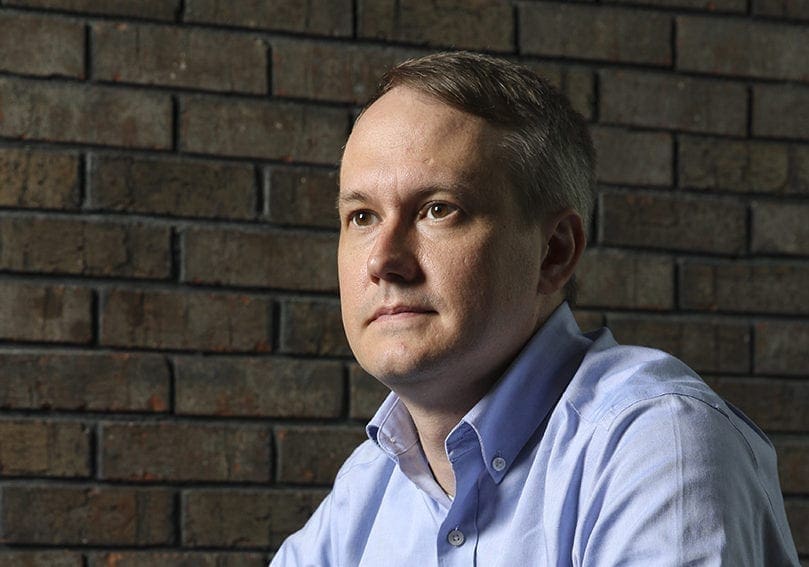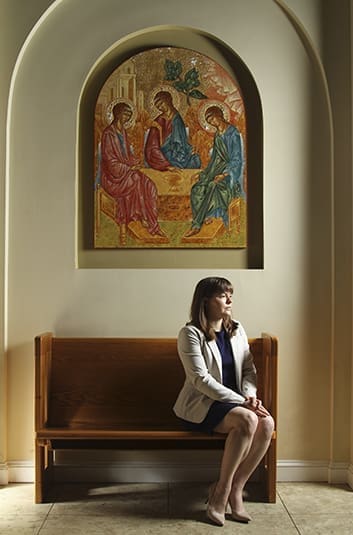 Photo By Michael Alexander
Photo By Michael AlexanderAtlanta
CLIP advocating for better collaboration between church leaders, laity
By ANDREW NELSON, Staff Writer | Published October 31, 2019
ATLANTA—Believers from 21 parishes in the Archdiocese of Atlanta have gathered for several months to raise the voices of laypeople in the church.
The independent group—known as the Catholic Lay Interparish Partnership (CLIP)—is advocating for greater collaboration with church leadership, to draw together clergy and lay decision makers.
“We’re baptized. We have a responsibility. We have a right,” said Sister Mary Priniski about the group’s mission.
For some Atlanta Catholics, the wave of revelations around the church’s sex abuse crisis in 2018 spurred them to examine their connections with the church, question how the church is governed and who makes decisions. What started with Catholics from four parishes has grown to more than 20.
A goal of CLIP is to survey the Catholic community. The results will be shared with the new Atlanta archbishop when he is installed to better understand the culture of the local Catholic community.
“Let’s spread a little light, instead of heat,” said Sister Mary, a former labor organizer.
Sister Mary, a member of the Adrian Dominican religious community, is one of the CLIP leaders, the director of the Aquinas Center at Emory University and the vicar for religious at the Archdiocese of Atlanta. Decorating her office wall is an image of St. Dominic hugging the crucifix.
She said laypeople seem to be invited to organize events in the archdiocese, from sitting on ecumenical committees to organizing the annual Eucharistic Congress. However, the options are limited for a group of laypeople when it comes to having the attention of the decision maker, the archbishop, she said.
One of the main avenues was the archdiocesan pastoral council, but it was discontinued, said Sister Mary. “We want to work together. We want laypeople to be engaged with the governance of the church,” she said.
The Archdiocese of Atlanta website includes information about a pastoral council, one of the early initiatives of Archbishop Wilton D. Gregory. He was appointed to lead the Archdiocese in Washington in the spring. It lists two dozen members of the council, but at least one member has died. The website does not say when the board last met.
Diocesan Administrator Bishop Joel M. Konzen, SM, said in an email laypeople serve in diocesan administration, parish councils and committees but “one needs to be mindful of both the general recommendations and the limitations that pertain from canon law.”
Before his appointment as a bishop, he was principal and president of Catholic schools in Atlanta and Texas. At the schools, he said, the goal was to work closely with the directors and lay administrators “to avoid surprises in decision-making” and to share information to and from the administration.
“I found that the variety of viewpoints available in consultation was invariably helpful, especially in divisive or deeply-felt questions,” said Bishop Konzen.
Many, if not most, of the administrators in a diocese, parish or school are likely to be lay Catholics, he said.
The painful summer of 2018
A series of painful revelations for the church began in the summer of 2018. Theodore McCarrick was stripped of his title as a cardinal following abuse allegations and was later removed from the priesthood.
A few weeks later, a Pennsylvania grand jury report examined the sex abuse of at least 1,000 children.
Financial payouts and abuse allegations were revealed against the former West Virginia bishop. He was later removed.
After all this, a survey by Gallup in early 2019 found 31% of Catholics rate the clergy’s honesty highly, down from 49% in 2017. Earlier this year, the organization found some 37% of U.S. Catholics said the abuse crisis had led them to question whether to remain in the church. That number in the midst of the 2002 crisis was 22%.
Believers said CLIP keeps the conversation on governance separate from moral issues facing the church.
Elizabeth Piper, 56, a longtime member of St. Jude Church, Sandy Springs, teaches confirmation class.
“The way we improve our parishes is by all the gifts and talents being used. It’s not about one man’s gifts, it’s all our gifts and talents,” she said.
Those who say the current structure is permanent don’t know church history, Piper said. The decision-making process developed over time, she said, and can be changed again to fully include lay voices.
“We are called to fulfill our baptismal promises,” she said.
The talents of laypeople, when put to work for the church, enhance it, she said.
Hearing from experts
The Aquinas Center at Emory University has hosted church experts following the 2018 revelations. A priest talked about clergy offenders. A theologian examined the church’s structure. A Catholic philanthropist promoted a culture change by those in leadership.
Kerry Robinson, the former executive director of Leadership Roundtable, said the church faces crises of sexual abuse and leadership failures. Leadership Roundtable is a church management group formed in the wake of the first wave of the sexual abuse crisis in 2002.
“In every aspect of the church, there is still a piercing pain and shame about the church’s twin crises of sexual abuse and leadership failures,” she said.
This spring, the group issued “Heal the Body of Christ,” a list of 50 recommendations for U.S. bishops and lay leaders to address the crisis.
Exercising top-down authority has been shown to be a failure and it wrecks the church’s credibility, she said.
“Who is at the table of decision makers? Diversity matters,” said Robinson, who was founding director for the management group.
She outlined broad areas—accountability, co-responsibility, transparency and justice—where the church faces an opportunity to reform its leadership and management.
The church responded to the 2002 crisis with the Dallas Charter, known as the Charter for the Protection of Children and Young People, establishing a lay-led board to oversee abuse allegations against priests and committing to a zero tolerance for abuse. She said the work has made the church one of the safest places for young people.
When a bishop favors openness and includes the expertise of laypeople it both rebuilds trust and it takes the burden off of a bishop to be the sole problem solver, she said.
By caring for the goods of the church, Robinson said, “we allow the church’s explicit religious mission to be advanced and enable its global charitable and humanitarian work to be carried out in a world greatly in need of God’s mercy, love, justice and hope.”

Oregon native Callie Tabor attends St. Thomas More Church, Decatur. Tabor, a doctoral student at Emory University, Atlanta, also teaches modern Catholicism at the university, where the issue of clergy sexual abuse is a topic of discussion from time to time. Photo By Michael Alexander
Walking away or staying rooted
Callie Tabor is pursuing a doctorate at Emory University in theological studies examining Catholicism and the arts.
“It was just the kind of water we were swimming in,” the 28-year-old said about her family’s faith life.
But the 2018 revelations forced her to rethink her ties to the church. Her sense of connection and community with other believers keeps her rooted. As horrifying as it was to read the reports of the “evil” abuse, Tabor said it spurred her to lean into building “a listening, collaborative church.”
Steve Weyer, 39, a member of the pastoral council at Our Lady of Lourdes Church, initiated what became CLIP with an email. In response to the scandals, he wanted to gather with laypeople to understand how parishes were responding. It began as a place to be heard, but has taken the issues deeper.
As experts share insights, he’s learned more about how the church operates.
“It is a measuring and balancing of different values in the church,” said Weyer, an attorney.
He has found comfort in the people and the faith, admitting it has been a winding road. “Our faith is wonderful. It has so much depth and diversity in it,” said Weyer. “When one aspect is failing me, I go to another place to abide for a while.”
A need for change
CLIP members are hopeful areas of the Atlanta church can be opened to voices of laypeople leading to a new sense of mission.
Robinson sees a new church culture taking shape. Some 50 bishops reached out to the Leadership Roundtable after the McCarrick scandal for assistance, which had not happened before.
“Cultural change takes time and is difficult. But difficult is not impossible,” she said.
For Piper, the group bolsters her spirits.
“I find myself hopeful. It’s really comforting other people are thinking along the same lines,” she said.
Piper believes it’s not fair to priests to expect them to make all the decisions about a parish or diocese. “There is a change needed to be made,” she said.
Tabor said the mission of the church can be enriched if there is openness to voices of clergy and laymembers together.
“If you’re going to be part of something, and if you love something, you have to also push it to be more fully what it is.